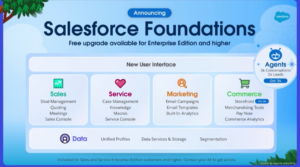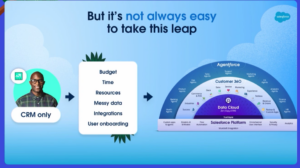At Dreamforce 24, Salesforce announced Foundations, a free upgrade for customers using Sales or Service Cloud Enterprise Edition or higher, that brings key cross-department features at no additional cost. Foundations includes Sales, Service, Marketing, Commerce, and Data Cloud features with an enhanced user interface, making it easier for businesses to get a unified view of their customer and build connected, AI-powered experiences across various customer touchpoint.
AI agents like those included in Agentforce, especially in configurations such as Sales Cloud with Foundations and Data Cloud, can offer powerful solutions for small and medium-sized businesses (SMBs). These solutions will help larger SMBs increase productivity, streamline operations, and fuel growth by leveraging artificial intelligence, automation, and data-driven insights.

Salesforce Foundations, Agentforce, and Data Cloud can work together in a complementary manner to deliver a cohesive and efficient customer relationship management experience. Each of these components serves a distinct purpose but integrates seamlessly to help businesses provide better customer service, enhance sales processes, and leverage data for deeper insights and personalization.

- Understanding Each Component’s Role: Before delving into how they work together, let’s define what each of these elements does:
- Salesforce Foundations: This add-on extends the core functionalities of Sales Cloud and Service Cloud, with other standard CRM capabilities like Marketing and Commerce. It also includes Data Cloud for managing customer data, and provides teams with a centralized platform for interacting with customers. It also includes the ability to customize the platform.
- Agentforce: Agentforce is a new layer of the Salesforce platform that enables companies to build and deploy AI agents that can autonomously take action across any business function. Agentforce agents go beyond chatbots and copilots, using advanced reasoning capabilities to make decisions and take action, resolving customer cases, qualifying sales leads, optimizing marketing campaigns and more. Agentforce delivers fully customizable, out-of-the-box autonomous AI agents that can connect to any enterprise data and take action across sales, service, marketing, and commerce. The first generally available OOTB agent is Agentforce Service Agent. But Salesoforce is working on releasing many types of focused agents – SDR Agents, Sales Coach Agent, Personalized Shopper Agent, Campaign Agent, etc.
- Data Cloud: This is Salesforce’s hyperscale data engine, formerly known as Salesforce Customer Data Platform (CDP). It helps unify structured and unstructured data from various sources into a single, comprehensive view of the customer. Data Cloud focuses on integrating and harmonizing data from multiple systems, enabling better customer segmentation, real-time insights, and more personalized interactions. Data Cloud powers predictive and generative AI, including Agentforce.
- How They Work Together: To see how these components interact, let’s look at the ways they integrate and support each other in a business’s operations.
a. Data Unification and Centralized Customer Information
- Data Cloud plays a key role in bringing together multimodal data from multiple sources, such as CRM data from Salesforce Foundations (Sales Cloud and Service Cloud), website interactions, social media data, and even data from external databases (Snowflake, Databricks, Amazon Redshift, Google BigQuery and more) with zero copy.
- By creating a 360-degree, unified view of the customer, Data Cloud ensures that all customer information is up-to-date and consistent across different parts of the organization.
- Agentforce benefits from this unified data as it allows customer service agents (or sales agents, personalized shopper agents, marketing campaign agents, etc.) to see a complete history of interactions, preferences, and behaviors for each customer. This enables agents to deliver more personalized service and resolve issues with greater context.
b. Enhanced Customer Service with Agentforce Service Agent - Agentforce Service Agent is a customer-facing autonomous AI agent that helps customers self-service with accurate, always-on support across any channel – like voice, WhatsApp, Facebook Messenger, websites, and more. An organization can set-up an Agentforce Service Agent in minutes with pre-built topics and actions for key service use cases, such as case management, reservation management, order inquiries, account management, delivery issues, and general FAQs. Escalations and hand-offs to human reps are seamless, with the full context of interactions instantly shared in the service console. When integrated with Data Cloud, Agentforce Service Agents can access detailed customer profiles, allowing them to understand a customer’s journey more thoroughly.
- This enables Agentforce Service Agent to tailor their responses based on recent customer support issue interactions and potentially preempt future issues by suggesting relevant solutions based on previous behaviors or transactions based on recent marketing interactions, purchase history, and other activities captured through Data Cloud.
c. Automating Workflows for a Seamless Experience - Salesforce Sales Cloud and Service Cloud includes automation tools like Flow and Process Builder that help create workflows and automate repetitive tasks. These automations can be further enhanced by additional apps and data from Foundations and data insights from Data Cloud.
- For example, if a customer’s behavior indicates they might be unhappy or at risk of leaving, users can trigger a Flow to automatically assign the case to a specialized Agentforce Service A gent in Service Cloud for immediate attention.
- Similarly, when sales data or customer engagement patterns change, Data Cloud can trigger automated actions like sending targeted campaigns or upsell opportunities using marketing features available with Salesforce Foundations.
d. Driving Sales and Marketing EffortsData Cloud surfaces customer data created across applications within Salesforce or in disparate systems automatically, providing insights across the customer journey to allow marketers to create highly targeted segmentation lists based on service case data or sales pipeline stages with insights that may have been previously inaccessible. Data Cloud also acts as a trusted data foundation for successful AI tools such as Agentforce Service Agent or Agentforce SDR, etc.e. Real-Time Data Activation and Personalized Engagement - Data Cloud enables the ability to process data in real-time, which means it can trigger updates across Salesforce Foundations features and Agentforce quickly.
- This real-time data flow means that customer service agents have access to the most current information, allowing them to react promptly to changes in customer behavior, and sales teams can react quickly to new opportunities.
Perspective:
Majority of small and medium businesses (SMBs) are only using CRM for sales departments with Sales Cloud. They also may have several different point solutions that different departments use – this creates disparate systems of many different apps each with its own data.
Salesforce’s connected platform with Foundations will help bring together teams from different departments and the associated data into one unified system. Data Cloud will unify the data from different contact records across those teams to provide the context for the business’s customer data.
With Foundations and Data Cloud available for Sales and Service Cloud, SMBs can unlock the potential of AI to enable SMBs to drive growth through informed, data-backed decisions. These solutions provide affordable, scalable, and practical tools that align with the needs of growing businesses, allowing them to compete in larger markets and thrive in a rapidly evolving landscape.
All this helps address the key question from SMBs “they don’t understand what AI can do for their businesses, how it can help?”
The key benefits these AI-infused solutions will provide:
- Increased Productivity: Automation of routine tasks, streamlined communication, and enhanced collaboration help businesses operate more efficiently.
- Better Customer Engagement: AI tools provide personalized, customer service and support, improving customer satisfaction and retention.
- Informed Decision-Making: Data-driven insights help SMBs make smarter business decisions, anticipate market trends, and allocate resources more effectively.
- Cost Savings: Automation and optimized resource management reduce waste and improve operational efficiency, saving both time and money.
- Scalability: AI allows businesses to grow without a proportional increase in workload, enabling them to handle more customers, orders, and data with minimal additional effort.
However, Salesforce will need to educate SMBs about these myriad tools and solutions, how they work together, and the ultimate benefit they provide. Since SMBs learn from the success of other SMBs, building a repository of early success stories will be essential to building momentum in the market.
